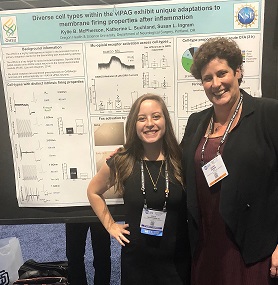Graduate Training
OHSU's graduate education programs in the neurosciences train post-baccalaureate students for future research, education and leadership roles in the world's top laboratories and institutions.
Students pursuing doctoral degrees often participate in major neurological research projects. They can be study leaders, working side by side with faculty members renowned for their scientific contributions.
Being accepted into OHSU's neuroscience training programs puts graduates in the vanguard of biomedical science research.
Student Spolight: Kylie McPherson

I am originally from Portland, but my family moved to Hood River when I was 10. I completed my BA in Biochemistry at Occidental College in Los Angeles, CA in 2013. I then went on to complete a Post-Baccalaureate Research Fellowship (IRTA) at the National Institute ofHealth, in a behavioral neuroscience lab at the National Institute on Drug Abuse (NIDA). I held a brief position as a research technician before starting in the Neuroscience Graduate Program (NGP) in June 2016.
From an early age, like most kids raised in Oregon that want to go into health or science professions, I wanted to be at OHSU. Over the years this goal changed forms. Initially, I wanted to be a medical doctor, which was inspired by Dr. Nate Selden, a neurosurgeon at OHSU that saved my partner's life from a ruptured arteriovenous malformation when we were 15 years old. However, during my college years I learned through a collection of clinical internships and research opportunities that my interests lied more in the basic science that fuels innovative shifts in medical practice. Funny enough, this led me to the same place as I am now a 3rd year Neuroscience PhD Candidate in the Neurological Surgery Department, which is chaired by Dr. Selden.
OHSU is not only a beacon of medical and science advancements for Pacific Northwest natives, but conveniently The Vollum Institute is an epicenter for electrophysiology—the technique I decided would allow me to best address my research questions.
I am in Dr. Susan Ingram's lab and we study the impact of inflammation in a brain circuit that is known to modulate pain. This brain circuit integrates the initial pain sensation with emotional and cognitive circuits that impact the pain experience. I hope to better define what cells exist within this circuit, which cells are specifically activated by painful stimuli, and how the higher brain centers alter the response to pain.
I was selected in the spring of my first year to receive a National Science Foundation Graduate Research Fellowship that funds my position in the lab. Additionally, I have most recently received a Research Leadership Scholarship through OHSU's School of Medicine to learn and contribute to discussions at the monthly OHSU Research Roundtable, as well as serving as the Social Media Liaison for The Vollum Institute. I spent the last year advocating for this new leadership role to help increase the program's visibility by promoting the successes and lives of our students and faculty using Twitter. Twitter has an engaged community of academic scientists and is proving to be an incredibly useful tool for networking.
As a student I have always favored the bigger, more exciting questions over routine learning. Having taken three years between college and graduate school I was anxious about finding my balance with coursework and research. However, the Neuroscience Graduate Program utilizes an accelerated core coursework schedule that allows students to obtain the critical fundamentals in a short window, so that we can then go into our laboratory rotations fully focused on the research. I found this, though rigorous, to be a perfect way to get to the big, exciting questions more efficiently.
I am reminded on a regular basis how happy I am to have chosen The Vollum for my graduate training because the mentorship not only from my PI, but also on a broader level, is exceptional. The majority of the faculty members that I have interacted with are approachable, helpful, and incredibly supportive. This environment has made it easy to stay on track, excited about my work, and educate myself on the process of becoming an academic scientist.
I am biased, but I do love Portland and the surrounding region. Being a local, I entered graduate school assuming I knew all of my favorite Portland places, but venturing out with classmates that are new to the city has been a refreshing reminder of how much Portland has to offer! My favorite things to do here include: finding a new hiking trail (Forest Park is a personal favorite), taking a day trip to the coast (especially when it is stormy), and basically spending as much time outside as possible.